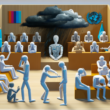AI’s wild prophecy of humanity’s quantum leaps sparks debate! Are these cryptic symbols profound or just digital noise? 🧩🤔 #AI #FutureTech #HumanityFuture
- Introduction: AI’s Enigmatic Vision of Tomorrow
- Contextualizing AI’s Role in Shaping Future Narratives
- Main Insights on AI’s Philosophical Predictions
- Challenges in Interpreting AI-Generated Content
- Future Outlook: AI’s Evolving Role in Cultural Narratives
- Final Reflections on AI and Humanity’s Future
Introduction: AI’s Enigmatic Vision of Tomorrow
In a world increasingly driven by artificial intelligence (AI), a recent viral post has sparked intrigue and speculation about the future of humanity. The post showcases an interaction with ChatGPT, an AI model, which was prompted to describe the future of humanity in an intentionally incomprehensible manner. The result was a cryptic mix of symbols and characters that appeared to defy interpretation. Yet, when decoded, the message offered a profound philosophical vision of humanity’s future, where technology and ancestral instincts merge to create new realities.
This article explores the implications of such AI-generated predictions and the human fascination with finding meaning in the seemingly meaningless. By delving into the nuances of AI’s role in shaping future narratives, we aim to provide a comprehensive understanding of how AI might influence our lives and perceptions. From the potential of AI to generate random yet profound insights to the broader cultural and technological impacts, we will scrutinize the layers of this viral phenomenon.
Contextualizing AI’s Role in Shaping Future Narratives
The viral post in question arose when an X user asked ChatGPT to articulate humanity’s future in a manner that would be indecipherable even to the most intelligent minds. The AI complied with a bizarre array of symbols, which, when prompted for translation, revealed an intriguing depiction of future human existence. This incident raises questions about the nature of AI’s “thought” processes and the extent to which these models can generate meaningful content.
Historically, AI has been utilized to solve complex problems, optimize processes, and enhance decision-making across various sectors. However, the ability of AI to produce creative or philosophical outputs is a relatively new frontier. This event serves as a reminder of AI’s potential to influence cultural narratives and philosophical discourse. It also underscores the human tendency to seek patterns and significance in randomness, a phenomenon known as pareidolia.
In dissecting this viral moment, we can trace the evolution of AI from basic computational models to sophisticated systems capable of simulating human-like creativity. This evolution has been marked by significant milestones, including the development of neural networks, natural language processing capabilities, and the integration of machine learning algorithms. Each advancement has brought AI closer to mimicking human cognitive functions, blurring the lines between machine-generated and human-authored content.
Main Insights on AI’s Philosophical Predictions
The Nature of AI-Generated Content
AI-generated content, especially when it comes to philosophical or speculative topics, is often characterized by its unpredictability. The ChatGPT incident exemplifies this, as the AI produced a message filled with abstract notions of quantum-level technology, overlapping realities, and sentient fabrics. Such content challenges our understanding of AI’s capabilities and prompts us to question the authenticity and reliability of AI-generated insights.
AI models like ChatGPT are trained on vast datasets, enabling them to recognize patterns and generate coherent responses. However, when tasked with producing incomprehensible content, these models may resort to assembling familiar elements in unfamiliar ways, resulting in outputs that appear profound but lack a basis in reality. This phenomenon highlights the limitations of AI in generating truly original ideas, as well as the potential for AI to inadvertently create new cultural narratives.
Human Tendency to Find Meaning
The viral nature of the ChatGPT post can be attributed, in part, to the human inclination to find meaning in randomness. When faced with the AI’s cryptic message, many individuals interpreted it as a genuine philosophical vision, reflective of possible future scenarios. This response is indicative of pareidolia, where people perceive patterns or connections in unrelated data.
In the context of AI, this tendency can lead to the overestimation of AI’s capabilities and the attribution of deeper meaning to its outputs. It also raises ethical considerations regarding the dissemination of AI-generated content and its potential to influence public perception. As AI continues to advance, it is crucial for society to develop frameworks for interpreting and contextualizing AI outputs, distinguishing between genuine insights and algorithmic fabrications.
The Implications of AI on Future Narratives
The ability of AI to generate speculative and philosophical content has implications for how we conceptualize the future. AI’s participation in cultural discourse could shape narratives about technological progress, human evolution, and societal transformation. This potential influence necessitates a critical examination of the role that AI might play in shaping public consciousness and the stories we tell about ourselves.
AI’s impact on future narratives is not limited to philosophical musings. In practical terms, AI-driven technologies are already redefining industries, from healthcare and finance to education and entertainment. These changes are reshaping societal structures and altering human interactions, prompting discussions about the ethical use of AI and its long-term consequences.
Challenges in Interpreting AI-Generated Content
The Unpredictability of AI Outputs
One of the primary challenges in interpreting AI-generated content is its inherent unpredictability. As demonstrated by the ChatGPT post, AI models can produce outputs that are difficult to decode and contextualize. This unpredictability stems from the complexity of the algorithms and the vastness of the datasets on which they are trained.
The lack of consistency in AI outputs poses a challenge for users seeking to understand and utilize AI-generated insights. Inconsistencies can lead to misunderstandings and misinterpretations, particularly when dealing with speculative content. To address this challenge, it is essential to develop methods for assessing the reliability and validity of AI-generated information.
Ethical Considerations and AI’s Influence on Perception
The use of AI to generate speculative content raises ethical questions about its impact on public perception. As AI becomes more integrated into media and communication channels, its potential to shape narratives and influence opinions grows. This influence necessitates a careful consideration of the ethical implications of AI use, including issues of bias, transparency, and accountability.
To mitigate potential negative impacts, it is crucial to establish ethical guidelines for the creation and dissemination of AI-generated content. These guidelines should address concerns about the authenticity of AI outputs, the potential for misinformation, and the responsibility of AI developers to ensure the accuracy and integrity of their models.
Future Outlook: AI’s Evolving Role in Cultural Narratives
As AI continues to develop, its role in shaping cultural narratives is likely to expand. Future advancements in AI technology could enable more nuanced and sophisticated content generation, blurring the lines between human and machine-authored narratives. This evolution presents both opportunities and challenges for society.
On one hand, AI-driven content generation could foster creativity and innovation, providing new perspectives and insights into complex issues. On the other hand, the increasing prevalence of AI-generated content raises concerns about the erosion of human creativity and the potential for AI to dominate cultural discourse.
To navigate this evolving landscape, it is essential to foster a collaborative approach that leverages the strengths of both human and machine intelligence. By embracing the potential of AI while maintaining a commitment to ethical standards and human-centric values, society can harness the power of AI to enrich cultural narratives and enhance our understanding of the world.
Final Reflections on AI and Humanity’s Future
In reflecting on the viral ChatGPT post and its implications, it becomes clear that AI has the potential to profoundly influence our perceptions of the future. While AI-generated content can offer intriguing and occasionally profound insights, it is crucial to approach these outputs with a critical mindset, recognizing the limitations and biases inherent in AI technologies.
As we continue to explore the possibilities of AI, it is essential to prioritize ethical considerations and cultivate a balanced perspective that values both technological innovation and human creativity. By doing so, we can ensure that AI serves as a tool for enhancing human understanding and fostering meaningful cultural narratives, rather than overshadowing them.
In conclusion, the interplay between AI and humanity’s future is complex and multifaceted, with the potential to reshape our narratives and redefine our existence. By engaging with AI thoughtfully and responsibly, we can harness its potential to illuminate new possibilities and enrich our collective journey into the unknown.











